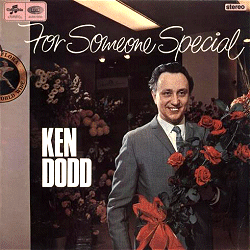Sixties
City presents
a wide-ranging series of
articles on all aspects of the Sixties, penned by the creator of the iconic
60s music paper Mersey
Beat
|
Sixties
City presents
a wide-ranging series of
articles on all aspects of the Sixties, penned by the creator of the iconic
60s music paper Mersey
Beat
|
|||||
|
|

|
His
chart albums included: ‘Tears Of Happiness’, on Columbia 33SX 1793, reached No6 on 25th December 1965, with a chart life of ten weeks. The album re-entered the charts at No20 on 16th March 1966 with a chart life of two weeks. ‘Hits For Now And Always’ was issued on Columbia SX 6060 and reached No14 on 23rd July 1966 with a chart life of eleven weeks. ‘For Someone Special’, on Columbia SCX 6224, reached No40 in the charts for one week. ‘I’ll Find A Way’ was issued on Columbia SCX 6379 in 1970 and ‘Broken Hearted’ was issued on Columbia DB 8725 and reached No15 on 5th December 1970 and No38 at re-entry on 13th February 1971. ‘When Love Comes Round Again’ was issued on Columbia DB8796 and reached No9 in the charts on 10th July 1971, with a chart life of 16 weeks. ‘Just Out Of Reach (Of My Two Empty Arms) was issued on Columbia DB8947 and reached No29 in the charts on 18th November 1972, with a chart life of eleven weeks. ‘(Think Of Me) Wherever You Are’ was issued on EMI 2342 and reached No21 in the charts on 29th November 1975 with a chart life of eight weeks. ‘Hold My Hand’ was issued on Images IMGS 0002 and reached No44 in the charts on 26th December 1981 with a chart life of five weeks. During Ken’s early career he sang comedy songs and during 1965 penned and recorded two comedy numbers ‘Where’s Me Shirt?’ and ‘Song Of the Diddymen’, the latter was issued as an EP on Music for Pleasure FP26 in 1968. There have been numerous albums and CDs of Ken’s recordings issued ranging from ‘His Greatest Hits’ on Music For Pleasure in 1988 to ‘All The Songs I Love’ on EMI Gold in January 2006 and over the years Ken has sold over 100 million records! In 1965 he appeared on the longest-ever run at the London Palladium, a total of 42 weeks, which broke all box office records and earned him a Variety Club Award. In 1982 he was awarded an OBE by the Queen for his services to show business and charity.In 1993 he received a Lifetime Achievement award at the British Comedy Awards. |
 |
Bill
Harry attended
the Liverpool College of Art with Stuart Sutcliffe and John Lennon and made
the arrangements for Brian Epstein to visit The Cavern, where he saw The
Beatles for the first time. Bill was a member of 'The Dissenters' and the
founder and editor of 'Mersey Beat', the iconic weekly music newspaper
that documented the early Sixties music scene in the Liverpool area and
is possibly best known for being the first periodical to feature a local
band called 'The Beatles'. He has worked as a high powered publicist, doing PR for acts such as Suzi Quatro, Free, The Arrows and Hot Chocolate and has managed press campaigns for record labels such as CBS, EMI, Polydor. Bill is the critically acclaimed author of a large number of books about The Beatles and the 60s era including 'The Beatles Who's Who', 'The Best Years of the Beatles' and the Fab Four's 'Encyclopedia' series. He has appeared on 'Good Morning America' and has received a Gold Award from the British Academy of Songwriters, Composers and Authors. |
|
Article
Text
UK
web hosting by
|